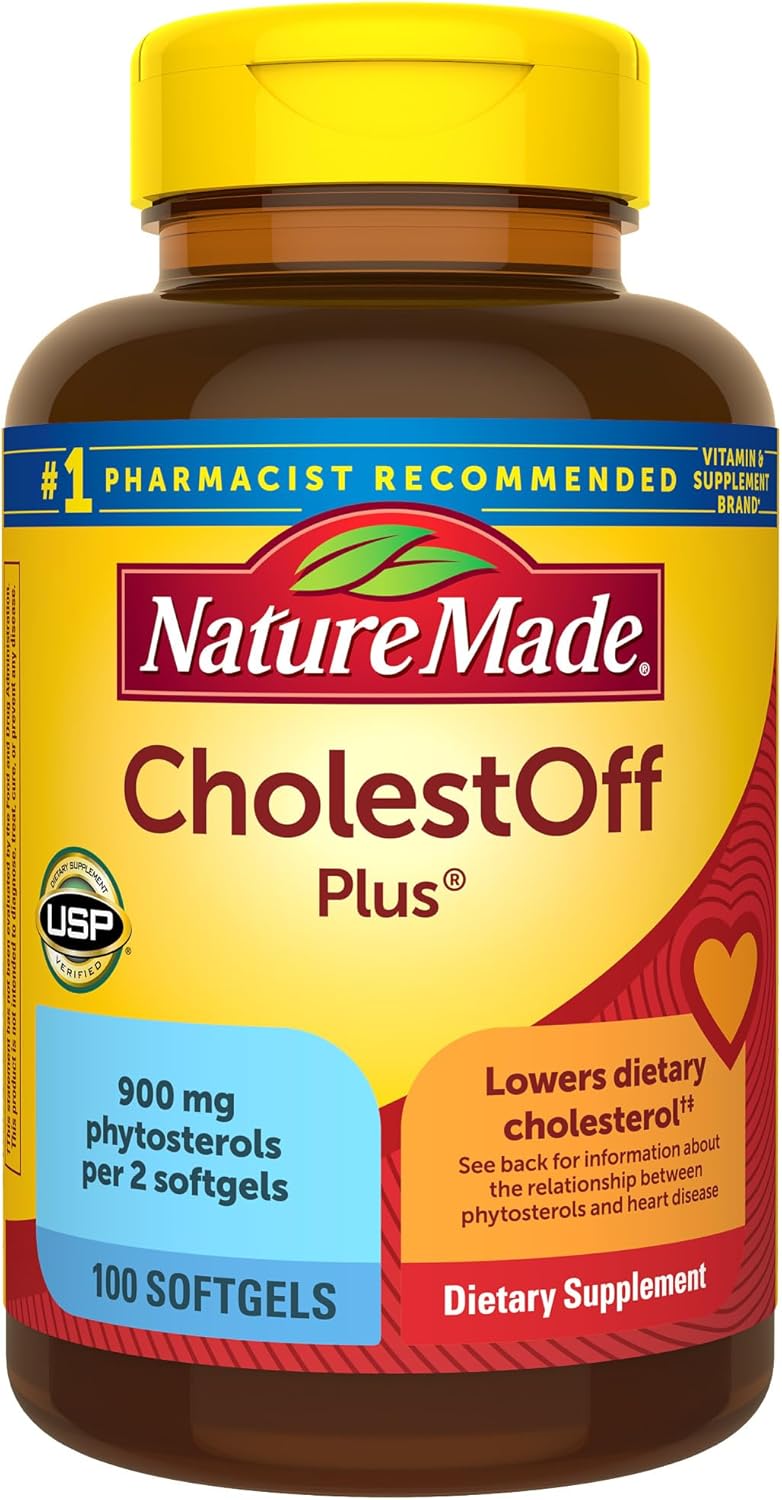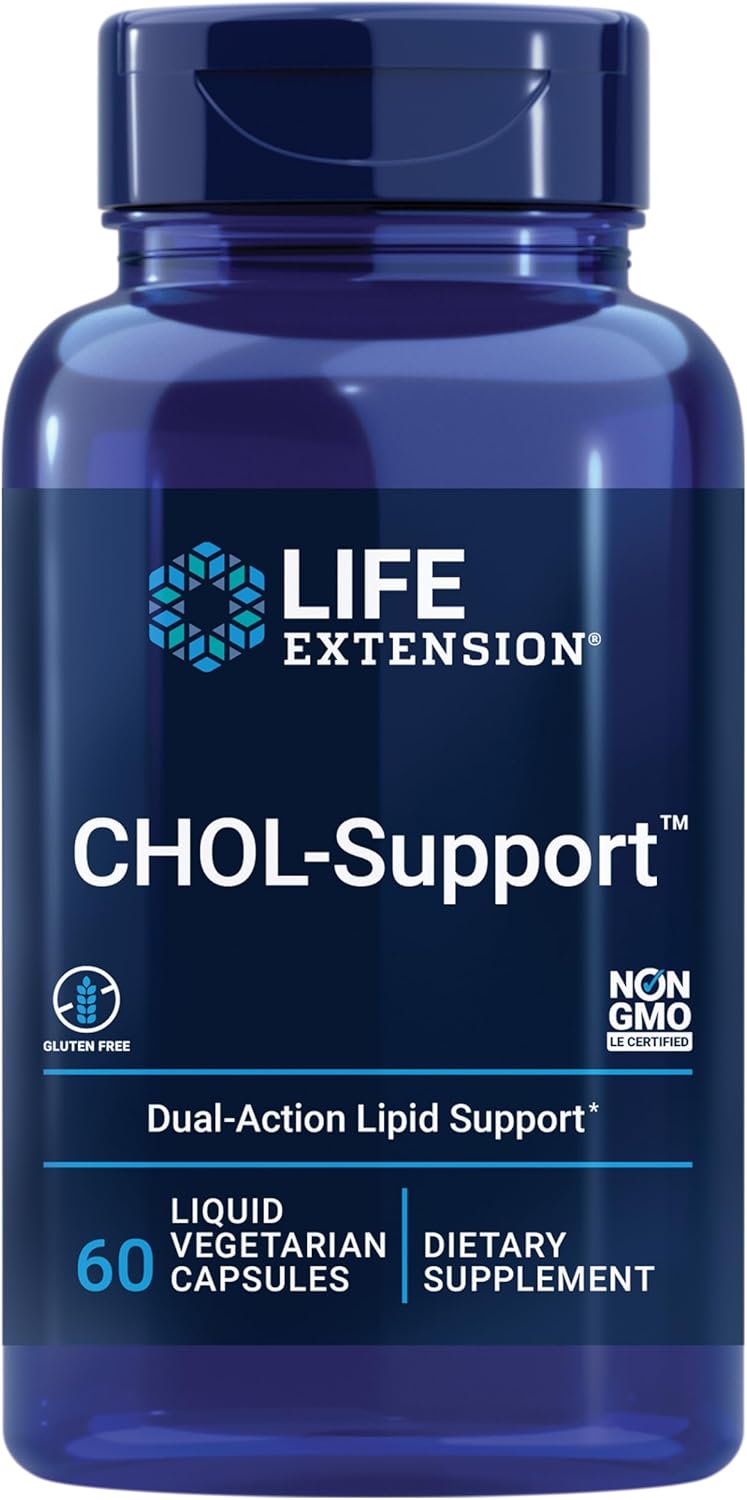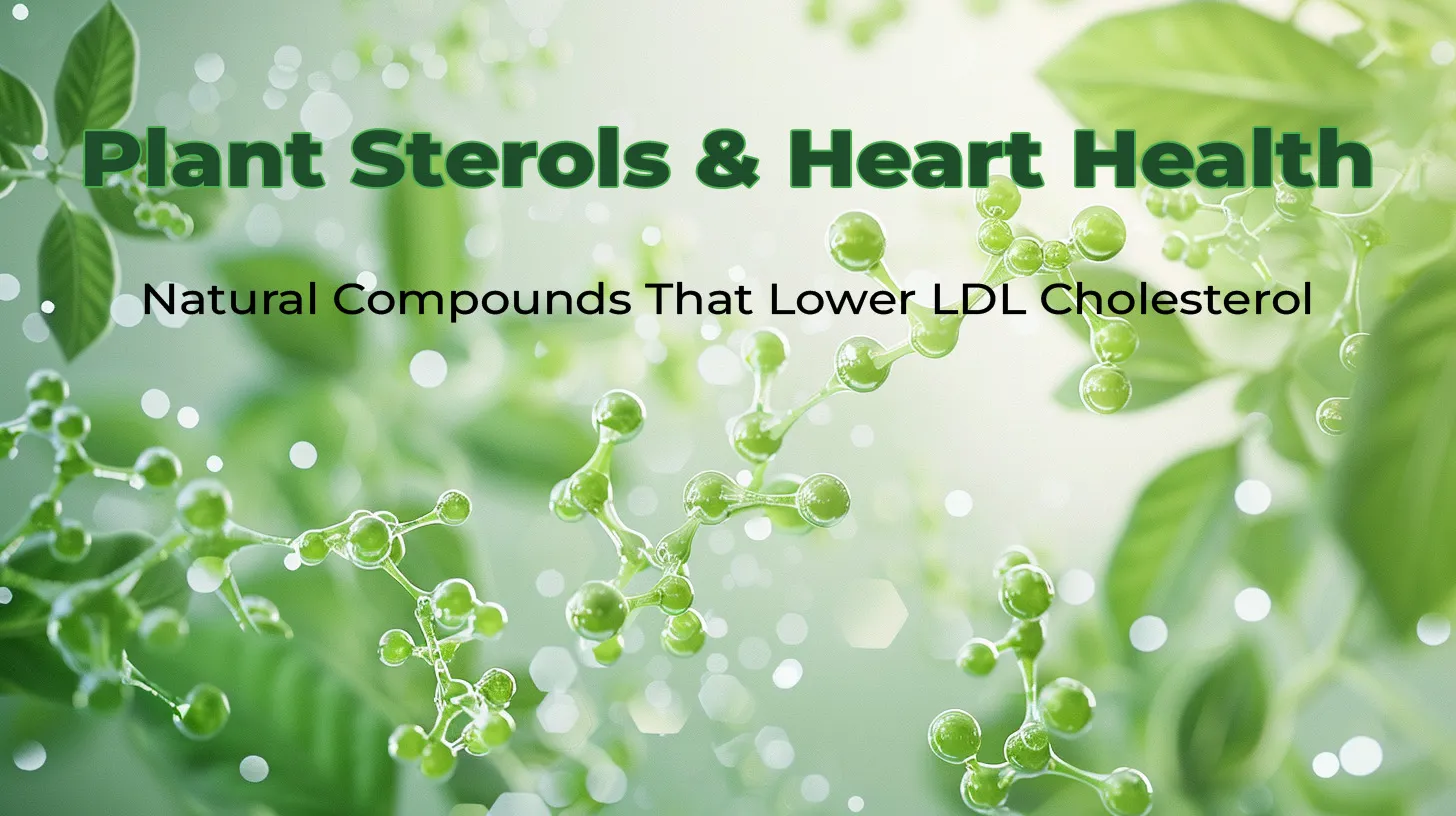Elevated LDL cholesterol levels are a significant risk factor for cardiovascular diseases, one of the leading causes of death globally. While lifestyle changes and prescription medications are commonly recommended to manage cholesterol levels, natural supplements like plant sterols have gained popularity for their cholesterol-lowering properties.
Plant sterol supplements, also called phytosterols, are naturally occurring compounds in plants that resemble cholesterol. When taken in sufficient amounts, they block the absorption of dietary cholesterol in the intestines, helping reduce LDL levels by up to 10–12% in as little as four weeks.
In this guide, we’ll break down the best plant sterol supplements to lower cholesterol, explain how they work, and share tips for choosing the right formula for your heart health.
If you’re looking for a clinically tested and trusted option, Nature Made CholestOff Plus remains the #1 recommended plant sterol supplement — verified by the USP and proven to lower LDL cholesterol when taken as directed.
What Are Plant Sterols and How Do They Work?
Plant sterols are structurally similar to cholesterol, but they compete with dietary cholesterol for absorption in the digestive system. By occupying the space in the intestines where cholesterol would typically be absorbed, plant sterols effectively reduce the amount of cholesterol that enters the bloodstream.
Clinical research (Mayo Clinic, NIH) indicates that consuming 1.5–3 grams of plant sterols daily can reduce LDL cholesterol by 8–12%, particularly when combined with a balanced diet low in saturated fat.
Key Types of Phytosterols
- Beta-sitosterol – the most abundant and well-studied sterol for cholesterol reduction.
- Campesterol & Stigmasterol – support additional LDL-lowering and anti-inflammatory effects.
- Stanols – similar function, often combined in “sterol + stanol” blends for enhanced absorption.
Top 5 Best Plant Sterol Supplements (2025)
| Supplement | Key Sterols | Dose / Serving | Best For |
|---|---|---|---|
| Nature Made CholestOff Plus | Plant sterol & stanol esters (900 mg) | 2 softgels | Overall Best |
| NOW Foods Beta-Sitosterol | Beta-sitosterol (500 mg) | 2 capsules | High-Strength Option |
| Life Extension Chol-Support | Beta-sitosterol + theaflavins | 900 mg | Antioxidant Support |
| Swanson Plant Sterol Complex | Mixed sterols (400 mg) | 2 softgels | Budget Pick |
| Carlyle Plant Sterols | Beta-sitosterol, Campesterol, Stigmasterol | 1200 mg | Widely Available Pick |
Top Plant Sterol Supplements
Here are some of the top plant sterol supplements available on the market today, each recognized for its high quality, effectiveness, and customer satisfaction.

Nature Made CholestOff Plus
A clinically supported blend of plant sterols and stanols shown to help reduce cholesterol absorption and support healthy LDL levels.
- Clinically tested dose for proven LDL reduction
- USP Verified for purity and consistency
- Trusted brand recommended by pharmacists for heart health

NOW Foods Beta-Sitosterol
Features a concentrated dose of beta-sitosterol to promote balanced cholesterol levels and support overall cardiovascular wellness.
- High concentration of beta-sitosterol
- Vegetarian capsules
- GMP Quality Assured: NPA A-rated GMP certification

Life Extension Chol-Support
Combines citrus bergamot and other research-backed ingredients to help maintain healthy cholesterol profiles and arterial function.
- Combines beta-sitosterol with theaflavins
- Helps maintain already healthy CoQ10 levels
- Certificate of Analysis is available for every ingredient.

Swanson Plant Sterol Complex
Delivers a standardized mix of plant sterols that naturally block dietary cholesterol absorption to support heart and vascular health.
- Standardized 400 mg plant sterol blend
- Provides support for overall cardiovascular health
- A reliable entry-level option for mild cholesterol management.

Carlyle Plant Sterols
Provides a high-potency sterol blend designed to help maintain healthy LDL levels and complement a heart-focused nutrition plan.
- 1200 mg of a full-spectrum phytosterol complex per serving
- Includes beta-sitosterol, campesterol, and stigmasterol.
- Free of Gluten, Wheat, Yeast, Lactose, Artificial Flavor, Preservatives and Non-GMO.
Benefits of Taking Phytosterol Supplements
- Lowers LDL cholesterol naturally (by up to 12%)
- Complements statin therapy for added LDL reduction
- Supports arterial and cardiovascular health
- May reduce inflammation and oxidative damage
- Backed by major health organizations, including the American Heart Association
Recommended Dosage & How to Take
| Goal | Typical Dosage | Timing |
|---|---|---|
| General LDL reduction | 1.5–3 grams per day | With meals containing fat |
| Maintenance | 900 mg daily | With breakfast or lunch |
Note: Plant sterols are generally safe but not recommended for people with sitosterolemia, a rare metabolic disorder.
How to Choose the Best Plant Sterol Supplement
When choosing a plant sterol supplement, consider the following factors:
- Dosage: Look for supplements that provide approximately 2 grams of plant sterols per day, as recommended, for maximum cholesterol-lowering effects.
- Formulation: Consider whether you prefer capsules, softgels, or powders. Some supplements may combine plant sterols with other heart-healthy ingredients, such as omega-3 fatty acids or antioxidants.
- Purity and Allergens: If you have dietary restrictions or allergies, select a supplement that is free from common allergens such as gluten, soy, and dairy. Non-GMO and hypoallergenic options are also available.
- Cost: While more expensive supplements may offer higher quality or additional ingredients, there are also effective and affordable options available.
- Brand Reputation: Choose supplements from reputable brands that utilize high-quality, clinically tested ingredients. Reading customer reviews can also provide insight into the product’s effectiveness and any potential side effects.
FAQs About Plant Sterol Supplements
Do plant sterol supplements really lower cholesterol?
Yes. Studies show daily use of 1.5–3 grams of phytosterols can lower LDL cholesterol by 8–12%, especially when combined with a healthy diet.
Can I take plant sterols with statins?
Yes — they work synergistically. Always check with your healthcare provider to ensure safe combination dosing.
Are plant sterols safe for long-term use?
Generally yes. They are well-tolerated and naturally present in many foods. Only individuals with sitosterolemia should avoid them.
What foods contain phytosterols?
Avocados, almonds, sunflower seeds, canola oil, and fortified margarines contain small amounts.
How long does it take to see results?
Most people experience a measurable reduction in LDL levels within 4–6 weeks of consistent use.
Conclusion
Plant sterol supplements are a natural and effective way to lower LDL cholesterol and support heart health. The supplements listed above are some of the best options available, each with its own unique benefits. When selecting a plant sterol supplement, consider your individual needs, preferences, and any dietary restrictions you may have. As always, consult with a healthcare professional before starting any new supplement regimen, especially if you are currently taking medication for cholesterol or other conditions.
By incorporating plant sterols into your daily routine, along with a heart-healthy diet and regular exercise, you can take significant steps toward managing your cholesterol levels and improving your overall cardiovascular health.
Related Reading
Explore more science-backed nutrients that support heart and metabolic health:
- The Health Benefits of Berberine — Discover how this powerful plant alkaloid helps regulate cholesterol, triglycerides, and blood sugar naturally.
- The Benefits of Omega-3 Oil: Understanding DHA and EPA — Learn how essential fatty acids support cardiovascular function and reduce inflammation.
- What Is Molecular Hydrogen? — Explore the antioxidant gas that’s showing promise for improving energy and cellular health.
References
Mayo Clinic Staff. (2024). Cholesterol: Top foods to improve your numbers — Plant sterols and stanols. Mayo Clinic. Retrieved from https://www.mayoclinic.org/diseases-conditions/high-blood-cholesterol/in-depth/cholesterol/art-20045192
National Institutes of Health (NIH) – Office of Dietary Supplements. (Updated 2023). Phytosterols and Phytostanols – Health Professional Fact Sheet. National Institutes of Health. Retrieved from https://ods.od.nih.gov/factsheets/Phytosterols-HealthProfessional/
Affiliate Disclosure
This website contains affiliate links, which means that if you click on a link and make a purchase, we may receive a small commission at no additional cost to you. These commissions help support the content we create and maintain. We only recommend products and services we believe add genuine value to our readers.
Medical Disclaimer
The information provided on this website is for informational and entertainment purposes only and is not intended as medical advice. The content is not reviewed or approved by the Food and Drug Administration (FDA) and should not be used to diagnose, treat, cure, or prevent any disease. Always consult with a qualified healthcare professional before making changes to your diet, supplement routine, or lifestyle.

